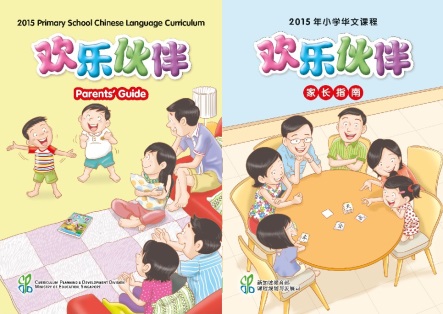Jayasutha d/o Vijaya Kumaran, Seng Kang Primary School, President’s Award for Teachers 2021 Finalist
A Primary 5 student stood nervously in front of a classroom. He took a deep breath and recited a tongue twister in Tamil out loud, which drew appreciative laughter from his classmates. He smiled, pleased at having met the mini challenge set by his teacher.
Recounting the incident, Mdm Jayasutha Vijaya Kumaran – better known as Vijay or Mrs Vijay among her Seng Kang Primary School colleagues and students – shared, “This student of mine is of mixed parentage. He hardly speaks Tamil at home and he doesn’t speak up at all in my class. So I tasked him to memorise a tongue twister because I knew his classmates would enjoy it, and that would make him feel more confident.
“I was so proud of him because he managed to say the phrase!”
All over the world, there is evidence that children gravitate towards the language of their peers and larger community as they mature. For many in Singapore, that language is English.
As such, some students may resist speaking their mother tongue, but Vijay hopes to change that by bringing laughter into the classroom. She believes that fun and learning need not be mutually exclusive, and that teachers do not always have to be serious to be effective.
Power of humour, personal narratives and small wins
Vijay’s father is a key inspiration behind her teaching approach, which is to use humour as a way to bond with her students.
She shared, “When I was growing up, my father would always share funny quotes and watch comedies with me. He is in his 70s now and he still sends me jokes and videos via WhatsApp. When that happens, I’ll always laugh no matter how I am feeling that day.
“Because of my father, I was inspired to use humour to make my students feel relaxed around me. It’s not about being a comedian in class. Rather, the aim is to establish a rapport with them.”
Vijay also believes in using storytelling as a teaching tool, and often shares personal stories and experiences with her students. This includes showing them videos of herself as a young national team debater to pique their interest in the Tamil language.
She said, “The children would laugh and comment, ‘Mrs Vijay, your hair looks so funny!’ But they would also reflect and say, ‘If my teacher can do it (be a national debater), so can I.’”
Teaching over two decades has made Vijay aware of students’ different learning preferences and learning how to cater to the needs of different students.
One of Vijay’s key techniques involves breaking up the learning into chunks to make the material or skills easier for her students to understand. She also makes it a point to set appropriate levels of challenges, empower them to make decisions about their learning, and celebrate their achievements, no matter how small.
Take spelling for example. Instead of making everyone in the class memorise and write the same number of words, Vijay assigns an individual target to each student based on his or her proficiency. She then lets the students decide which words they would like to learn and to be tested on, based on a list provided. The rest of the words in the list will be tested verbally with guidance from Vijay.
By using this approach, Vijay observes that her students are less inclined to feel overwhelmed or easily defeated, especially those who are weak in the subject, or have learning needs like dyslexia.
In her quest to create an inclusive learning environment, Vijay also once procured a Tamil keyboard for a student who struggled with handwriting due to a health condition. She taught the student typing skills using the keyboard so that he can use it as an assistive device for class assignments, and so that he would not be left behind in his work.
Cultivating language interest through play and performances
Vijay’s passion for teaching is evident and she is always brimming with new ideas to encourage creativity in learning.
In 2018, her interest in debate and drama led her to launch Seng Kang Primary School’s inaugural Tamil language competition, Kalaicharam. From character portrayal and singing to public speaking and debate, every participant was given a chance to perform in front of an audience. Vijay even roped in teachers from other primary and secondary schools to be part of the judging panel in the final round of the competition.
“Learning a language is not just about reading from the textbook, or writing in the workbook. I believe you can also encourage students to develop a passion for their mother tongue through the arts,” she enthused.
Kalaicharam proved to be a hit with both students and parents alike. By popular demand, the competition was held again in 2019, and returned in 2020 in the form of a virtual event.
Not one to rest on her laurels, Vijay plans to develop a physical board game targeted at lower primary students next. The aim is to make the Tamil language more relatable and accessible to them. She also hopes the board game will promote family bonding and offer an alternative to screen time.
Although the specific rules of the game are still being worked out, she envisions the gameplay elements to include instructional cards requiring players to express themselves in Tamil, before they can advance on the board. For example, they may have to say a proverb, spout simple poetry, sing a nursery rhyme or answer a question.
Vijay added, “I think the board game would provide a great opportunity for the young to play with their parents, grandparents and siblings. From a language development perspective, it would also ‘force’ the players to speak the language for the entire duration of the game in a fun way.”
A teacher of teachers
Vijay attributes her strong foundation in the Tamil language to her primary and secondary school teachers. As a young child, she used to emulate her Tamil teacher in primary school, Mrs Rajan, during pretend play. Coincidentally, Mrs Rajan was also Vijay’s colleague when the latter first started teaching. She remains close to Mrs Rajan and even invited her to join Seng Kang Primary School as a flexi-adjunct teacher in recent years.
In turn, Vijay’s enthusiasm for the language has inspired two of her former students to become Tamil teachers. She continues to pay it forward by mentoring new teachers in her school.
She shared, “I always emphasise to my mentees two things: First, we must practise what we preach. When I am with my fellow Tamil teachers, I would insist we speak in Tamil. We can’t be telling our students to speak the language when we are not setting an example ourselves.”
“Second, if you see teaching as just a job, you may excel in it but you won’t have the fire in you to go the distance. So find ways to keep your passion for teaching alive.







.jpg)